Unit 12 Innovation_高二英语北师大版(2019)选择性必修第四册教材习题精讲课件(共50张)
文档属性
| 名称 | Unit 12 Innovation_高二英语北师大版(2019)选择性必修第四册教材习题精讲课件(共50张) | 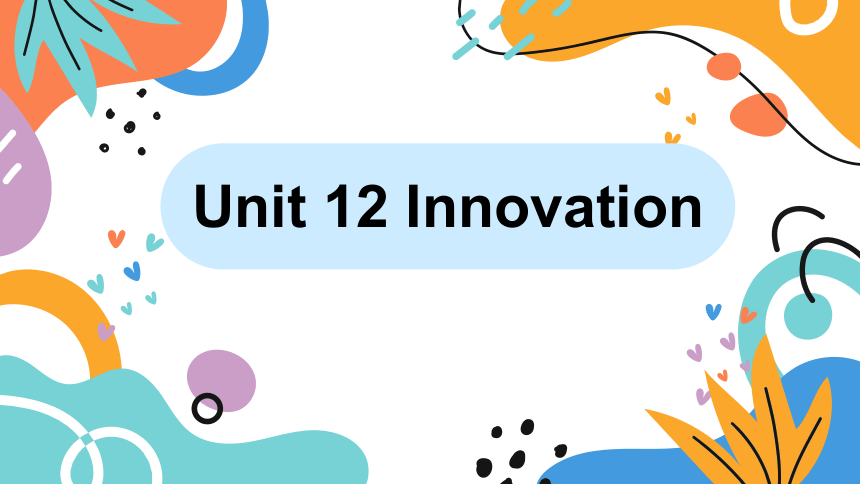 | |
| 格式 | pptx | ||
| 文件大小 | 3.0MB | ||
| 资源类型 | 教案 | ||
| 版本资源 | 北师大版(2019) | ||
| 科目 | 英语 | ||
| 更新时间 | 2025-04-02 21:52:27 | ||
图片预览

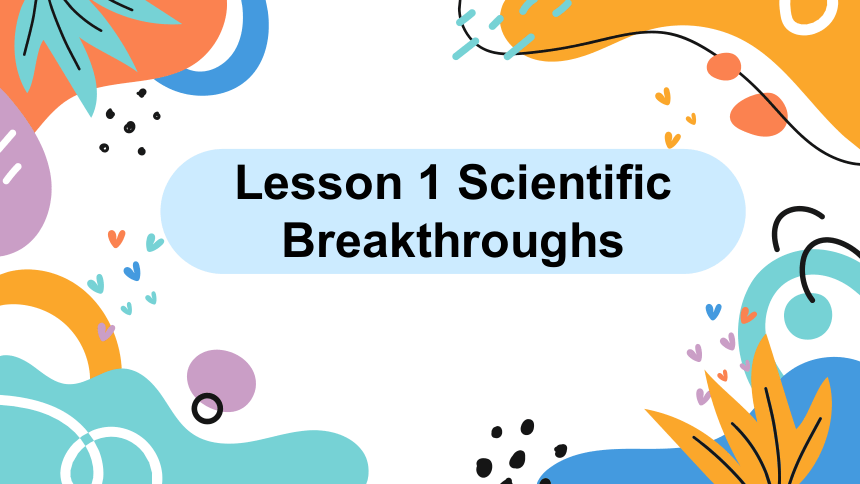
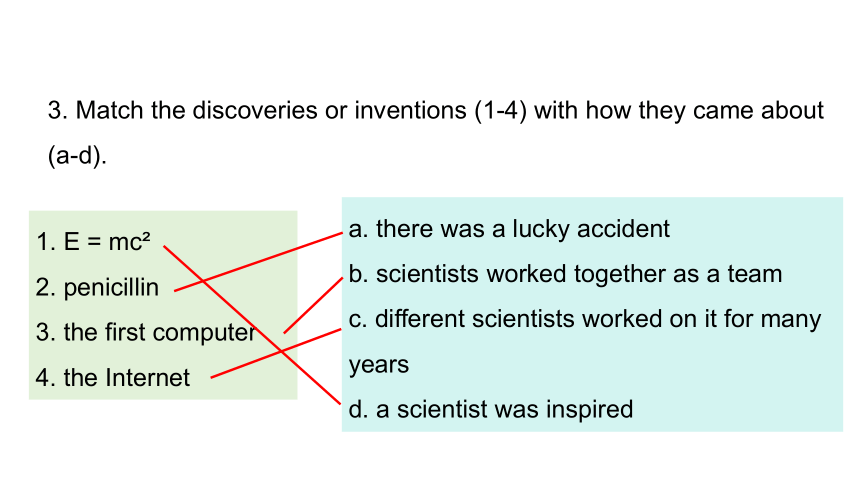
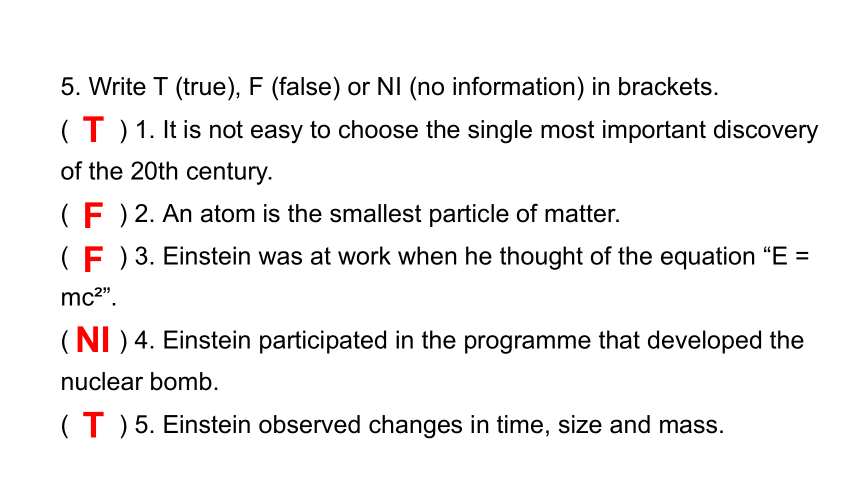
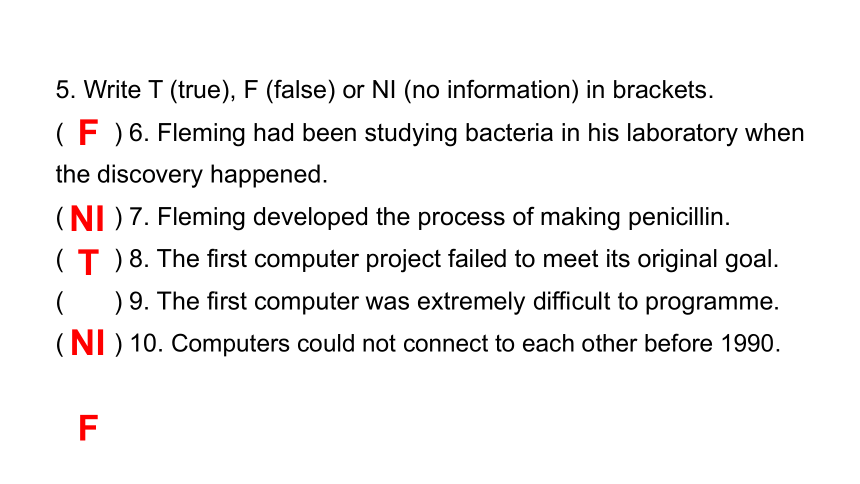
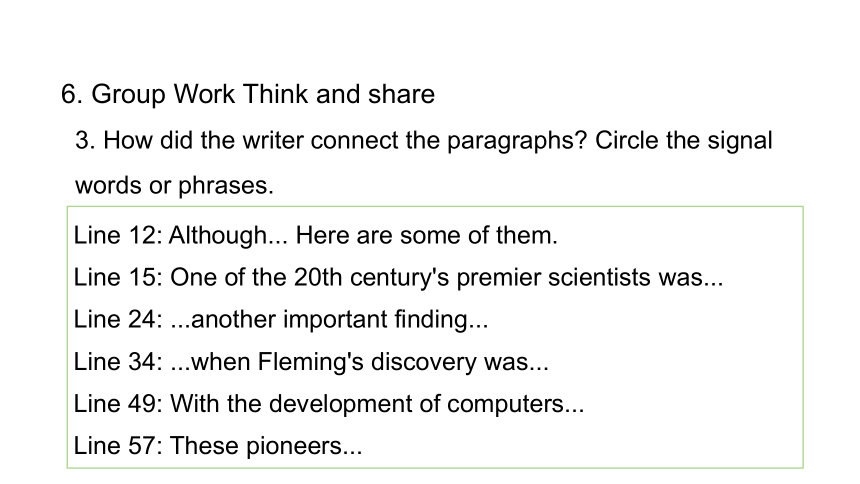
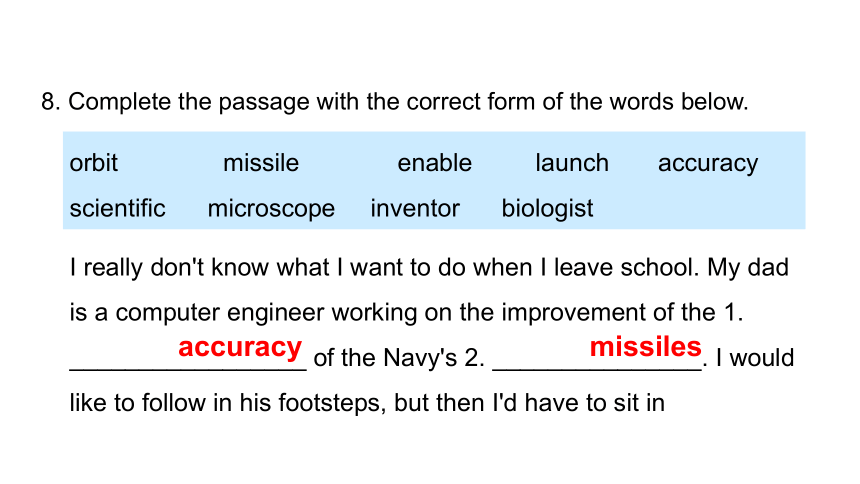
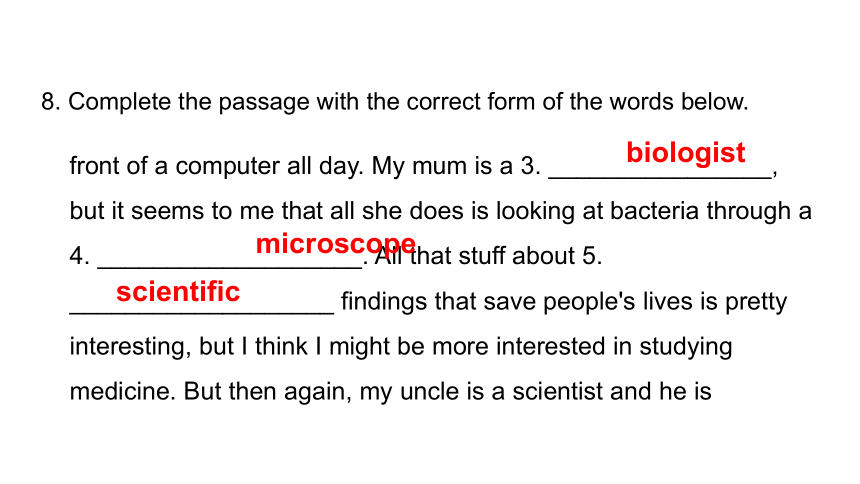
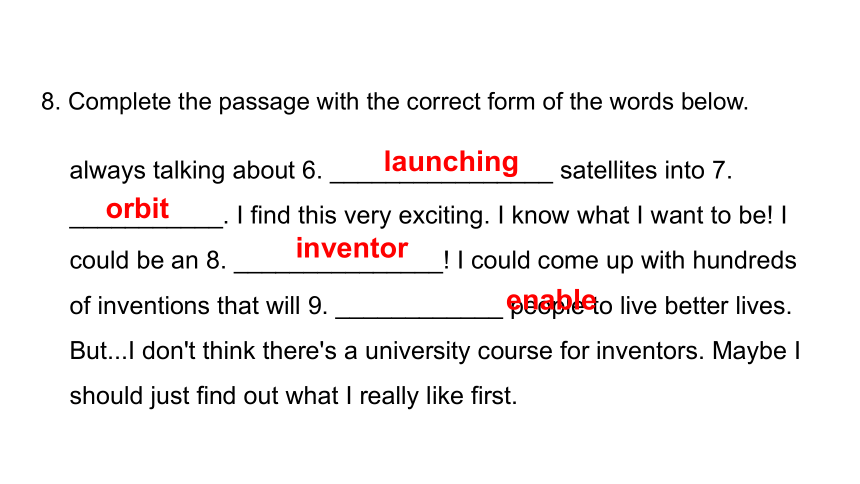
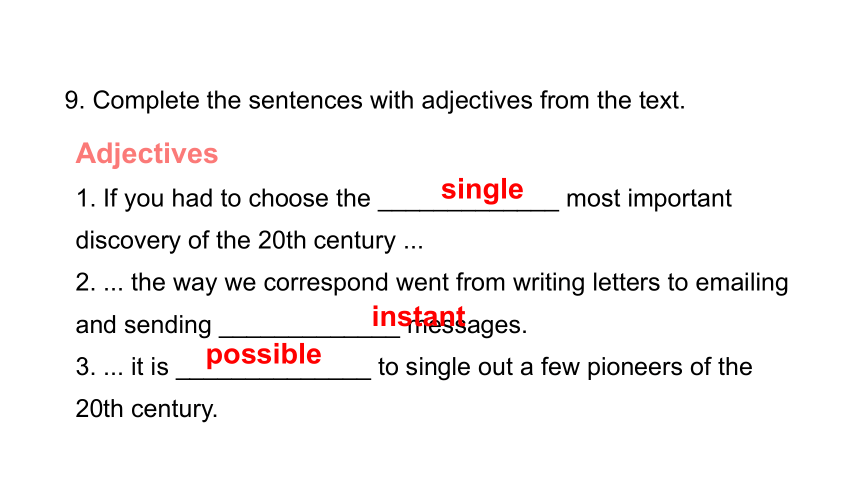
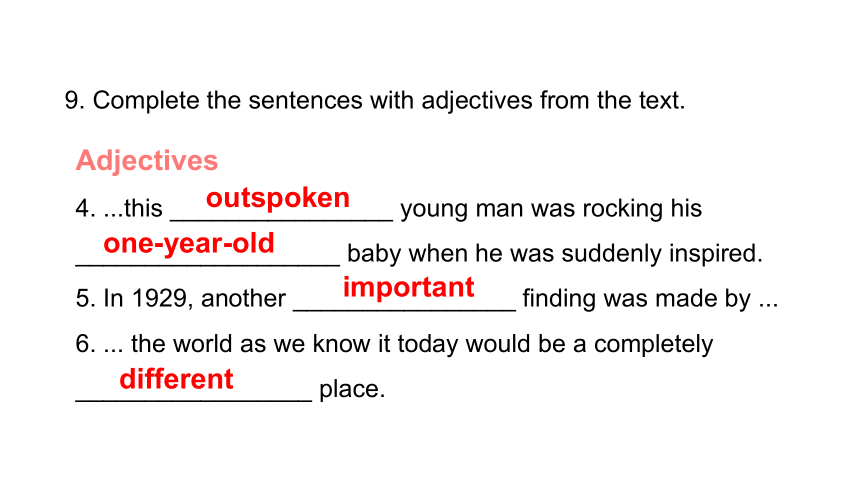
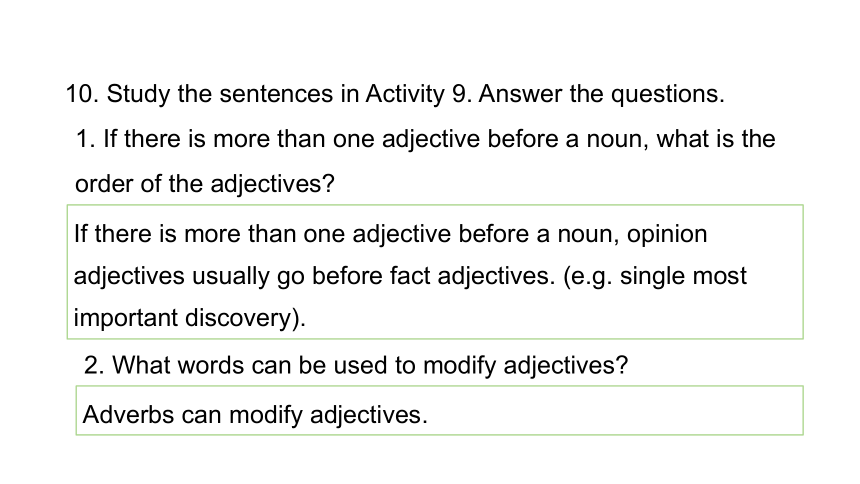
文档简介
(共50张PPT)
Unit 12 Innovation
Lesson 1 Scientific Breakthroughs
3. Match the discoveries or inventions (1-4) with how they came about (a-d).
1. E = mc
2. penicillin
3. the first computer
4. the Internet
a. there was a lucky accident
b. scientists worked together as a team
c. different scientists worked on it for many years
d. a scientist was inspired
5. Write T (true), F (false) or NI (no information) in brackets.
( ) 1. It is not easy to choose the single most important discovery of the 20th century.
( ) 2. An atom is the smallest particle of matter.
( ) 3. Einstein was at work when he thought of the equation “E = mc ”.
( ) 4. Einstein participated in the programme that developed the nuclear bomb.
( ) 5. Einstein observed changes in time, size and mass.
T
F
F
NI
T
5. Write T (true), F (false) or NI (no information) in brackets.
( ) 6. Fleming had been studying bacteria in his laboratory when the discovery happened.
( ) 7. Fleming developed the process of making penicillin.
( ) 8. The first computer project failed to meet its original goal.
( ) 9. The first computer was extremely difficult to programme.
( ) puters could not connect to each other before 1990.
F
NI
T
NI
F
6. Group Work Think and share
Line 12: Although... Here are some of them.
Line 15: One of the 20th century's premier scientists was...
Line 24: ...another important finding...
Line 34: ...when Fleming's discovery was...
Line 49: With the development of computers...
Line 57: These pioneers...
3. How did the writer connect the paragraphs Circle the signal words or phrases.
8. Complete the passage with the correct form of the words below.
I really don't know what I want to do when I leave school. My dad is a computer engineer working on the improvement of the 1. _________________ of the Navy's 2. _______________. I would like to follow in his footsteps, but then I'd have to sit in
accuracy
missiles
orbit missile enable launch accuracy
scientific microscope inventor biologist
front of a computer all day. My mum is a 3. ________________, but it seems to me that all she does is looking at bacteria through a 4. ___________________. All that stuff about 5. ___________________ findings that save people's lives is pretty interesting, but I think I might be more interested in studying medicine. But then again, my uncle is a scientist and he is
biologist
microscope
scientific
8. Complete the passage with the correct form of the words below.
8. Complete the passage with the correct form of the words below.
always talking about 6. ________________ satellites into 7. ___________. I find this very exciting. I know what I want to be! I could be an 8. _______________! I could come up with hundreds of inventions that will 9. ____________ people to live better lives. But...I don't think there's a university course for inventors. Maybe I should just find out what I really like first.
launching
orbit
inventor
enable
9. Complete the sentences with adjectives from the text.
Adjectives
1. If you had to choose the _____________ most important discovery of the 20th century ...
2. ... the way we correspond went from writing letters to emailing and sending _____________ messages.
3. ... it is ______________ to single out a few pioneers of the 20th century.
single
instant
possible
9. Complete the sentences with adjectives from the text.
Adjectives
4. ...this ________________ young man was rocking his ___________________ baby when he was suddenly inspired.
5. In 1929, another ________________ finding was made by ...
6. ... the world as we know it today would be a completely _________________ place.
outspoken
one-year-old
important
different
10. Study the sentences in Activity 9. Answer the questions.
If there is more than one adjective before a noun, opinion adjectives usually go before fact adjectives. (e.g. single most important discovery).
1. If there is more than one adjective before a noun, what is the order of the adjectives
Adverbs can modify adjectives.
2. What words can be used to modify adjectives
10. Study the sentences in Activity 9. Answer the questions.
For example, "one-year-old" and "strong-willed" are compound adjectives. They are formed when two or more adjectives are joined together by one or more hyphens.
3. Find some compound adjectives. How are they formed
10. Study the sentences in Activity 9. Answer the questions.
Adjectives that show quality, opinion, size, shape or colour are comparable. Adjectives that show quantity, number, nationality or material are non-comparable.
4. Which of the adjectives are comparable adjectives Which are non-comparable adjectives
Lesson 2 Aha Moment
3. Listen to what the host says at the beginning of the interview. Answer the questions.
1. What is an “aha moment”
An “aha moment” is when you are working on some creative jobs for several days but little progress is made and then suddenly an idea flies into your mind.
3. Listen to what the host says at the beginning of the interview. Answer the questions.
2. What is going to be discussed in the interview
How does the inspiration come Why do some people work so hard but achieve very little, while some others seem to do nothing but good ideas emerge
4. Listen to Part 1 of the interview. What is the misunderstanding about an “aha moment” What is Dr. Bond’s opinion about the relationship between an“aha moment”and hard work
Misunderstanding:
Some think an "aha moment" happens __________________.
Dr. Bond's opinion:
· Behind a brilliant idea, there's often _______________________ involved in it.
by coincidence
incredible hard work
4. Listen to Part 1 of the interview. What is the misunderstanding about an “aha moment” What is Dr. Bond’s opinion about the relationship between an“aha moment”and hard work
Dr. Bond's opinion:
· He/ She has to ______________________________ before making a discovery. (In other words: Inspiration doesn't appear __________________.)
invest many years of study
incidentally
5. What example does Dr. Bond use What indicator does he use to show his opinion in talking about the example
Albert Einstein seemed to be inspired in discovering the “theory of relativity” when he was rocking his baby. But actually, he had buried himself a great deal in the study of it for years. The indicator Dr. Bond uses is “but actually”.
6. Listen to Part 2 of the interview. Write down the four stages of the creative process. What does each one possibly mean
Stage 1 p_____________
Stage 2 incubation
Stage 3 e_____________
Stage 4 e_____________
reparation
valuation
laboration
7. Underline and correct the wrong information in the following statements.
1. “Aha moments” happen by coincidence.
2. The discovery of the “theory of relativity ”came easily when Albert Einstein was rocking his baby.
It actually comes from the efforts you have been constantly making.
But actually, he had buried himself a great deal in the study of it for years.
7. Underline and correct the wrong information in the following statements.
3. According to the radio interview, only a few people have experienced "aha moments".
4. Dr. Bond's opinion is that all hard work will lead to "aha moments".
Everyone may have experienced some kinds of "aha moments".
No, he doesn't believe that.
9. Listen to the interview. Answer the questions.
1. How does Dr. Bond explain what he means by "incubation"
2. Why is incubation important
People bury themselves in an area, keep calm and wait for ideas to grow.
Because creative insights take time to grow or emerge.
9. Listen to the interview. Answer the questions.
3. What are the two example questions to ask at the stage of evaluation
4. What do you do in the elaboration phase of the creative process
Does it really work How does it work
You spend hours and hours to write out your articles or make your business plans.
10. Listen and plete the Talk Builder.
Polite Requests
1. __________________________ more about the stages
2. __________________ what "incubation" means
3. __________________ "doing nothing"
4. __________________ I don't understand what "elaboration" means.
Would you please tell us
I’m afraid
Would you please tell us
Does that mean
Could you explain
Could you explain
Does that mean
I'm afraid
11. In what situation or to whom would you use polite requests
I would use polite requests to my teachers, people I don’t know well and the elderly.
Lesson 3
Stephen Hawking
2. Look at the webpage about Stephen plete the information on the left. Then go back to Activity 1, and answer the questions in more detail.
Birth
______________________
Education
· St Albans School
· The University of ________________ (1955-1962), studied ________________
· PhD, the University of Cambridge (1966)
8 January, 1942
Oxford
physics
2. Look at the webpage about Stephen plete the information on the left. Then go back to Activity 1, and answer the questions in more detail.
Career
· Institute of Astronomy, ________________ (1968-1973)
· Professor of Mathematics, Cambridge (1979-2009)
· Director of Research, Centre for Theoretical Cosmology, Cambridge (2009-2018)
Cambridge
2. Look at the webpage about Stephen plete the information on the left. Then go back to Activity 1, and answer the questions in more detail.
Family
Married to Jane Wilde (1965-1991, three children) and Elaine Mason (1995-2006)
3. Pair work Read the webpage again. Complete the timeline about Stephen Hawking’s life and work. Then tell each other about him in pairs based on the timeline.
1942
1959
_____
1985
was born
was diagnosed with ALS
1963
went to University of Oxford to study physics
had to have an operation/ lost his speech as a result
3. Pair work Read the webpage again. Complete the timeline about Stephen Hawking’s life and work. Then tell each other about him in pairs based on the timeline.
1988
2005
2012
2018
died
his book A Brief History of Time: From the Big Bang to Black Holes sold one copy for every 750 people on earth
decided to write a simpler version, A briefer History of Time
said to a TV audience of 900 million people at the opening ceremony of London 2012 Olympics: “Look up at the stars and not down at your feet… be curious.”
6. Group Work Think and share.
1. What was Stephen Hawking’s attitude towards life Find evidence from the webpage.
Hawking had a positive attitude towards life and he never got disappointed or discouraged from his illness.
“Hawking was famous. Not just for his brilliant work in theoretical physics and cosmology, but also …”
6. Group Work Think and share.
1. What was Stephen Hawking’s attitude towards life Find evidence from the webpage.
"Although Hawking's physical abilities declined over decades, he never ceased his studies…"
"In spite of his disease, Hawking didn't consider himself an unlucky man."
"My expectations were reduced to zero when I was 21. Everything since then has been a bonus."
6. Group Work Think and share.
2. What do you think this saying by Stephen Hawking means: "Look up at the stars and not down at your feet...be curious."
It means that we should not focus on our everyday lives and worry too much about unimportant matters. We should think on a larger scale and be curious about nature and the simple things of life.
6. Group Work Think and share.
3. How are the paragraphs on the webpage connected to each other Find and circle the indicators.
Hawking later found…, although Hawking’s physical…, Hawking also wrote…, In spite of his disease
Stephen Hawking was born in 1942. he studied at Universities of Oxford and Cambridge, but at the age of 21, he was diagnosed with a serious disease. However, he finished his 1. __________ and got a job at the University of Cambridge and continued his work in 2. ______________ physics and 3. ____________. While his reputation for his work spread, his physical ability 4. ___________. In 1985, after an
7. Complete the summary of Stephen Hawking’s life based on what you have learnt.
studies
theoretical
cosmology
declined
operation, he started to use 5. _____________________________ to help him talk. However, Hawking never ceased his studies and he continued to develop his theories on 6. ______________. Hawking believed that he was not an unlucky person. From his diagnosis at 21 he regarded everything since then as a 7. __________ . He was proud of his family and his work, and he appreciated the help that many people had given him.
7. Complete the summary of Stephen Hawking’s life based on what you have learnt.
speech-generating equipment
black holes
bonus
8. Complete the Word Builder with phrasal prepositions. What other phrasal prepositions do you know
Phrasal Prepositions
1. _______________ 21, when Hawking spent his first year at the University of Cambridge …
2. His theory was that there was a sort of hole
__________________ a black hole.
At the age of
in the centre of
8. Complete the Word Builder with phrasal prepositions. What other phrasal prepositions do you know
Phrasal Prepositions
3. _____________ trying to find one big new explanation, scientists should …
4. _____________ his disease, Hawking didn’t consider himself an unlucky man.
Instead of
In spite of
9. Use the phrasal prepositions below to complete the webpage below on Stephen Hawking.
After the Operation
In 1985, Hawking had to have an operation on his throat. 1. ________________ the operation, he couldn’t speak at all. However, 2. ________________ not being able to talk, he was
As a result of
in spite of
instead of with the help of
in spite of as a result of
9. Use the phrasal prepositions below to complete the webpage below on Stephen Hawking.
still able to communicate by raising his eyebrows when someone pointed to the right letter on a spelling card.
A computer expert heard of Hawking’s problem and sent him a computer programme. 3. __________________ this programme, Hawking could choose words from a menu on a screen.
With the help of
9. Use the phrasal prepositions below to complete the webpage below on Stephen Hawking.
4. ______________ pressing a switch in his hand, he could control the programme by making a head or eye movement. At first, he could run the programme on a desktop computer, but then a man called David Mason fitted a small portable computer to his wheelchair.
Instead of
plete the questions with a preposition.
1. What are you interested _______
2. In your family, who do you have a good relationship _______
3. What are you afraid _______
4. What are you proud _______
5. What's the most serious problem that's ever happened _______ you
6. How did you deal _______ your problem
in
with
of
of
to
with
Writing Workshop
2. Read the essay "James Watt and the Steam Engine". Answer the questions.
1. Who was James Watt
James Watt was an engineer, scientist and inventor, who was born in Scotland in 1736.
2. What did he improve
He developed and made a great improvement on the Newcomen steam engine, which was commonly used at the time.
2. Read the essay "James Watt and the Steam Engine". Answer the questions.
3. How did he make the improvement
3. He watched a kettle boiling water and thought deeply about what was happening. He reflected further on the process. Later he began to experiment with steam and eventually developed the steam engine.
2. Read the essay "James Watt and the Steam Engine". Answer the questions.
4. What contribution did he make to human history
His invention changed the course of human history. Steam engines helped to power factories that started the Industrial Revolution.
Thank you
Unit 12 Innovation
Lesson 1 Scientific Breakthroughs
3. Match the discoveries or inventions (1-4) with how they came about (a-d).
1. E = mc
2. penicillin
3. the first computer
4. the Internet
a. there was a lucky accident
b. scientists worked together as a team
c. different scientists worked on it for many years
d. a scientist was inspired
5. Write T (true), F (false) or NI (no information) in brackets.
( ) 1. It is not easy to choose the single most important discovery of the 20th century.
( ) 2. An atom is the smallest particle of matter.
( ) 3. Einstein was at work when he thought of the equation “E = mc ”.
( ) 4. Einstein participated in the programme that developed the nuclear bomb.
( ) 5. Einstein observed changes in time, size and mass.
T
F
F
NI
T
5. Write T (true), F (false) or NI (no information) in brackets.
( ) 6. Fleming had been studying bacteria in his laboratory when the discovery happened.
( ) 7. Fleming developed the process of making penicillin.
( ) 8. The first computer project failed to meet its original goal.
( ) 9. The first computer was extremely difficult to programme.
( ) puters could not connect to each other before 1990.
F
NI
T
NI
F
6. Group Work Think and share
Line 12: Although... Here are some of them.
Line 15: One of the 20th century's premier scientists was...
Line 24: ...another important finding...
Line 34: ...when Fleming's discovery was...
Line 49: With the development of computers...
Line 57: These pioneers...
3. How did the writer connect the paragraphs Circle the signal words or phrases.
8. Complete the passage with the correct form of the words below.
I really don't know what I want to do when I leave school. My dad is a computer engineer working on the improvement of the 1. _________________ of the Navy's 2. _______________. I would like to follow in his footsteps, but then I'd have to sit in
accuracy
missiles
orbit missile enable launch accuracy
scientific microscope inventor biologist
front of a computer all day. My mum is a 3. ________________, but it seems to me that all she does is looking at bacteria through a 4. ___________________. All that stuff about 5. ___________________ findings that save people's lives is pretty interesting, but I think I might be more interested in studying medicine. But then again, my uncle is a scientist and he is
biologist
microscope
scientific
8. Complete the passage with the correct form of the words below.
8. Complete the passage with the correct form of the words below.
always talking about 6. ________________ satellites into 7. ___________. I find this very exciting. I know what I want to be! I could be an 8. _______________! I could come up with hundreds of inventions that will 9. ____________ people to live better lives. But...I don't think there's a university course for inventors. Maybe I should just find out what I really like first.
launching
orbit
inventor
enable
9. Complete the sentences with adjectives from the text.
Adjectives
1. If you had to choose the _____________ most important discovery of the 20th century ...
2. ... the way we correspond went from writing letters to emailing and sending _____________ messages.
3. ... it is ______________ to single out a few pioneers of the 20th century.
single
instant
possible
9. Complete the sentences with adjectives from the text.
Adjectives
4. ...this ________________ young man was rocking his ___________________ baby when he was suddenly inspired.
5. In 1929, another ________________ finding was made by ...
6. ... the world as we know it today would be a completely _________________ place.
outspoken
one-year-old
important
different
10. Study the sentences in Activity 9. Answer the questions.
If there is more than one adjective before a noun, opinion adjectives usually go before fact adjectives. (e.g. single most important discovery).
1. If there is more than one adjective before a noun, what is the order of the adjectives
Adverbs can modify adjectives.
2. What words can be used to modify adjectives
10. Study the sentences in Activity 9. Answer the questions.
For example, "one-year-old" and "strong-willed" are compound adjectives. They are formed when two or more adjectives are joined together by one or more hyphens.
3. Find some compound adjectives. How are they formed
10. Study the sentences in Activity 9. Answer the questions.
Adjectives that show quality, opinion, size, shape or colour are comparable. Adjectives that show quantity, number, nationality or material are non-comparable.
4. Which of the adjectives are comparable adjectives Which are non-comparable adjectives
Lesson 2 Aha Moment
3. Listen to what the host says at the beginning of the interview. Answer the questions.
1. What is an “aha moment”
An “aha moment” is when you are working on some creative jobs for several days but little progress is made and then suddenly an idea flies into your mind.
3. Listen to what the host says at the beginning of the interview. Answer the questions.
2. What is going to be discussed in the interview
How does the inspiration come Why do some people work so hard but achieve very little, while some others seem to do nothing but good ideas emerge
4. Listen to Part 1 of the interview. What is the misunderstanding about an “aha moment” What is Dr. Bond’s opinion about the relationship between an“aha moment”and hard work
Misunderstanding:
Some think an "aha moment" happens __________________.
Dr. Bond's opinion:
· Behind a brilliant idea, there's often _______________________ involved in it.
by coincidence
incredible hard work
4. Listen to Part 1 of the interview. What is the misunderstanding about an “aha moment” What is Dr. Bond’s opinion about the relationship between an“aha moment”and hard work
Dr. Bond's opinion:
· He/ She has to ______________________________ before making a discovery. (In other words: Inspiration doesn't appear __________________.)
invest many years of study
incidentally
5. What example does Dr. Bond use What indicator does he use to show his opinion in talking about the example
Albert Einstein seemed to be inspired in discovering the “theory of relativity” when he was rocking his baby. But actually, he had buried himself a great deal in the study of it for years. The indicator Dr. Bond uses is “but actually”.
6. Listen to Part 2 of the interview. Write down the four stages of the creative process. What does each one possibly mean
Stage 1 p_____________
Stage 2 incubation
Stage 3 e_____________
Stage 4 e_____________
reparation
valuation
laboration
7. Underline and correct the wrong information in the following statements.
1. “Aha moments” happen by coincidence.
2. The discovery of the “theory of relativity ”came easily when Albert Einstein was rocking his baby.
It actually comes from the efforts you have been constantly making.
But actually, he had buried himself a great deal in the study of it for years.
7. Underline and correct the wrong information in the following statements.
3. According to the radio interview, only a few people have experienced "aha moments".
4. Dr. Bond's opinion is that all hard work will lead to "aha moments".
Everyone may have experienced some kinds of "aha moments".
No, he doesn't believe that.
9. Listen to the interview. Answer the questions.
1. How does Dr. Bond explain what he means by "incubation"
2. Why is incubation important
People bury themselves in an area, keep calm and wait for ideas to grow.
Because creative insights take time to grow or emerge.
9. Listen to the interview. Answer the questions.
3. What are the two example questions to ask at the stage of evaluation
4. What do you do in the elaboration phase of the creative process
Does it really work How does it work
You spend hours and hours to write out your articles or make your business plans.
10. Listen and plete the Talk Builder.
Polite Requests
1. __________________________ more about the stages
2. __________________ what "incubation" means
3. __________________ "doing nothing"
4. __________________ I don't understand what "elaboration" means.
Would you please tell us
I’m afraid
Would you please tell us
Does that mean
Could you explain
Could you explain
Does that mean
I'm afraid
11. In what situation or to whom would you use polite requests
I would use polite requests to my teachers, people I don’t know well and the elderly.
Lesson 3
Stephen Hawking
2. Look at the webpage about Stephen plete the information on the left. Then go back to Activity 1, and answer the questions in more detail.
Birth
______________________
Education
· St Albans School
· The University of ________________ (1955-1962), studied ________________
· PhD, the University of Cambridge (1966)
8 January, 1942
Oxford
physics
2. Look at the webpage about Stephen plete the information on the left. Then go back to Activity 1, and answer the questions in more detail.
Career
· Institute of Astronomy, ________________ (1968-1973)
· Professor of Mathematics, Cambridge (1979-2009)
· Director of Research, Centre for Theoretical Cosmology, Cambridge (2009-2018)
Cambridge
2. Look at the webpage about Stephen plete the information on the left. Then go back to Activity 1, and answer the questions in more detail.
Family
Married to Jane Wilde (1965-1991, three children) and Elaine Mason (1995-2006)
3. Pair work Read the webpage again. Complete the timeline about Stephen Hawking’s life and work. Then tell each other about him in pairs based on the timeline.
1942
1959
_____
1985
was born
was diagnosed with ALS
1963
went to University of Oxford to study physics
had to have an operation/ lost his speech as a result
3. Pair work Read the webpage again. Complete the timeline about Stephen Hawking’s life and work. Then tell each other about him in pairs based on the timeline.
1988
2005
2012
2018
died
his book A Brief History of Time: From the Big Bang to Black Holes sold one copy for every 750 people on earth
decided to write a simpler version, A briefer History of Time
said to a TV audience of 900 million people at the opening ceremony of London 2012 Olympics: “Look up at the stars and not down at your feet… be curious.”
6. Group Work Think and share.
1. What was Stephen Hawking’s attitude towards life Find evidence from the webpage.
Hawking had a positive attitude towards life and he never got disappointed or discouraged from his illness.
“Hawking was famous. Not just for his brilliant work in theoretical physics and cosmology, but also …”
6. Group Work Think and share.
1. What was Stephen Hawking’s attitude towards life Find evidence from the webpage.
"Although Hawking's physical abilities declined over decades, he never ceased his studies…"
"In spite of his disease, Hawking didn't consider himself an unlucky man."
"My expectations were reduced to zero when I was 21. Everything since then has been a bonus."
6. Group Work Think and share.
2. What do you think this saying by Stephen Hawking means: "Look up at the stars and not down at your feet...be curious."
It means that we should not focus on our everyday lives and worry too much about unimportant matters. We should think on a larger scale and be curious about nature and the simple things of life.
6. Group Work Think and share.
3. How are the paragraphs on the webpage connected to each other Find and circle the indicators.
Hawking later found…, although Hawking’s physical…, Hawking also wrote…, In spite of his disease
Stephen Hawking was born in 1942. he studied at Universities of Oxford and Cambridge, but at the age of 21, he was diagnosed with a serious disease. However, he finished his 1. __________ and got a job at the University of Cambridge and continued his work in 2. ______________ physics and 3. ____________. While his reputation for his work spread, his physical ability 4. ___________. In 1985, after an
7. Complete the summary of Stephen Hawking’s life based on what you have learnt.
studies
theoretical
cosmology
declined
operation, he started to use 5. _____________________________ to help him talk. However, Hawking never ceased his studies and he continued to develop his theories on 6. ______________. Hawking believed that he was not an unlucky person. From his diagnosis at 21 he regarded everything since then as a 7. __________ . He was proud of his family and his work, and he appreciated the help that many people had given him.
7. Complete the summary of Stephen Hawking’s life based on what you have learnt.
speech-generating equipment
black holes
bonus
8. Complete the Word Builder with phrasal prepositions. What other phrasal prepositions do you know
Phrasal Prepositions
1. _______________ 21, when Hawking spent his first year at the University of Cambridge …
2. His theory was that there was a sort of hole
__________________ a black hole.
At the age of
in the centre of
8. Complete the Word Builder with phrasal prepositions. What other phrasal prepositions do you know
Phrasal Prepositions
3. _____________ trying to find one big new explanation, scientists should …
4. _____________ his disease, Hawking didn’t consider himself an unlucky man.
Instead of
In spite of
9. Use the phrasal prepositions below to complete the webpage below on Stephen Hawking.
After the Operation
In 1985, Hawking had to have an operation on his throat. 1. ________________ the operation, he couldn’t speak at all. However, 2. ________________ not being able to talk, he was
As a result of
in spite of
instead of with the help of
in spite of as a result of
9. Use the phrasal prepositions below to complete the webpage below on Stephen Hawking.
still able to communicate by raising his eyebrows when someone pointed to the right letter on a spelling card.
A computer expert heard of Hawking’s problem and sent him a computer programme. 3. __________________ this programme, Hawking could choose words from a menu on a screen.
With the help of
9. Use the phrasal prepositions below to complete the webpage below on Stephen Hawking.
4. ______________ pressing a switch in his hand, he could control the programme by making a head or eye movement. At first, he could run the programme on a desktop computer, but then a man called David Mason fitted a small portable computer to his wheelchair.
Instead of
plete the questions with a preposition.
1. What are you interested _______
2. In your family, who do you have a good relationship _______
3. What are you afraid _______
4. What are you proud _______
5. What's the most serious problem that's ever happened _______ you
6. How did you deal _______ your problem
in
with
of
of
to
with
Writing Workshop
2. Read the essay "James Watt and the Steam Engine". Answer the questions.
1. Who was James Watt
James Watt was an engineer, scientist and inventor, who was born in Scotland in 1736.
2. What did he improve
He developed and made a great improvement on the Newcomen steam engine, which was commonly used at the time.
2. Read the essay "James Watt and the Steam Engine". Answer the questions.
3. How did he make the improvement
3. He watched a kettle boiling water and thought deeply about what was happening. He reflected further on the process. Later he began to experiment with steam and eventually developed the steam engine.
2. Read the essay "James Watt and the Steam Engine". Answer the questions.
4. What contribution did he make to human history
His invention changed the course of human history. Steam engines helped to power factories that started the Industrial Revolution.
Thank you
同课章节目录
- Unit 10 Connections
- Lesson 1 How Closely Connected Are We?
- Lesson 2 Community Spirit
- Lesson 3 Anne of Green Gables
- Unit 11 Conflict And Compromise
- Lesson 1 Living In a Community
- Lesson 2 Dealing with Conflict
- Lesson 3 War Memories
- Unit 12 Innovation
- Lesson 1 Scientific Breakthroughs
- Lesson 2 Aha Moment
- Lesson 3 Stephen Hawking
